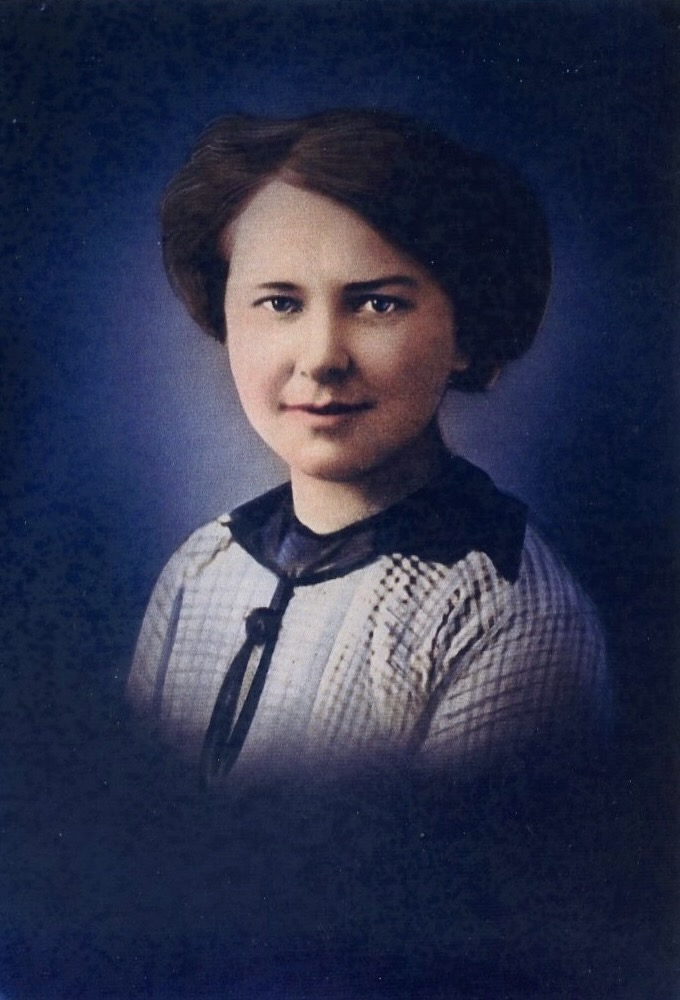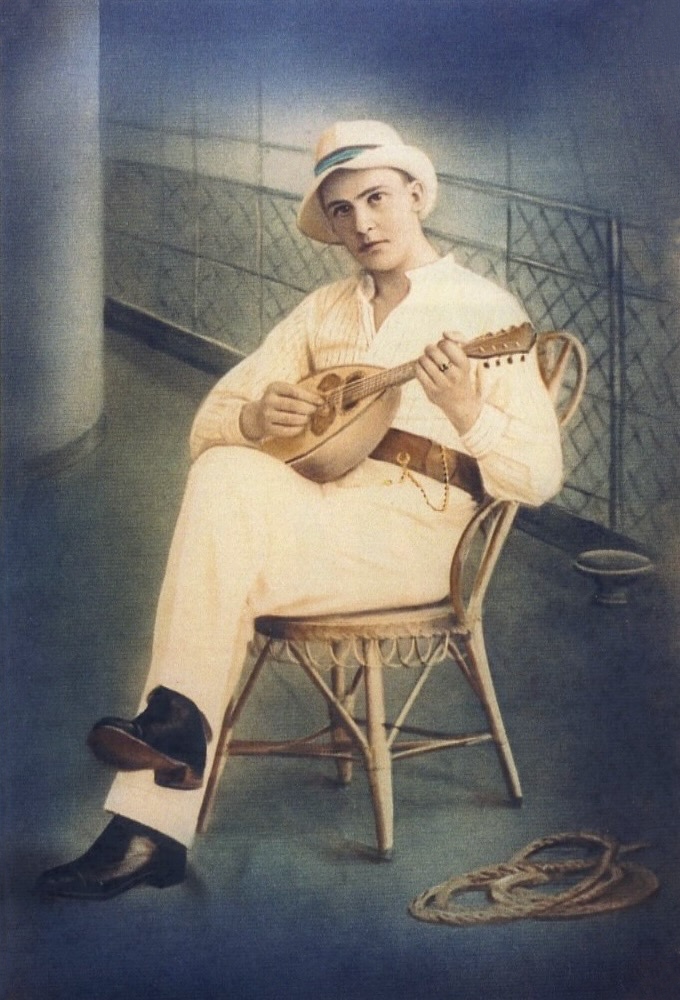Welcome to the Zegelin Family web site
This site is dedicated to the memory of Karl and Frieda Zegelin. Karl was born in 1889 and died in 1977. Frieda was born in 1888 and died in 1970. They emigrated from Germany to Australia in 1913 and settled in Rochester, Victoria. The family has thrived in Australia.

Frieda Zegelin - née Lortz. c. 1910

Karl Friedrich Zegelin. c. 1912
The Zegelin Clan in Australia and the USA (according to George Zegelin)
In this era of ancestry research it is high time for the history of this pioneering family to be written. It has fallen to me to undertake the task, as the only known serious family researcher of the subject. It is dedicated to the founders of the clan, my parents - Karl Friedrich Zegelin and Christiane Elisabeth Frieda Zegelin (née Lortz). It will deal mainly with the Australian branch, and will, of course, be of interest to the USA branch - with a total membership probably now numbering many scores.
In recent centuries many family histories have been buried by wars and migrations. However modern communications have made it possible to delve deeply into old records, to satisfy the curious or merely to seek illustrious forbears. In retirement, I also succumbed to the temptation. I unearthed and finally distributed to my immediate family, an opus with a wealth of data going back more than two two centuries. My most interesting discovery was an order in about 1730 from Kaiser Wilhelm the Great of Prussia, to Major Johann Christian von Zegelin, an army officer then stationed in Istanbul during the Russo-Turkish war.
Karl’s father Gustav Zegelin, was born in Prussian Damnitz (now Polish) in 1854 but moved west to nearby Stettin in Germany. His grandfather, Michael Friedrich Zegelin, was also born in Damnitz in 1806. (State boundaries in that region changed several times, between Prussia, Sweden and Poland resulting in uncertainty about the ethnic origin of citizens).
Gustav married Ida Hulda Amanda Klatt, and had 3 children - Elsa, Elfrieda and Karl Friedrich. He was a successful lumber wholesaler (see NOTE BELOW) and retired at age 45, to enjoy his investments in city property. Elsa migrated to the USA, and died in Michigan aged 97, while Elfrieda moved to Hannover, dying aged 95. Karl was born on 30/11/1889, and migrated to Australia, where he died in 1977 aged 87.
After his normal schooling, and probably enjoying living in bourgeois comfort, including holidays on the Baltic coast, Karl graduated from a horticultural college in Wittstock-am-Dosse. In 1909 he was conscripted for 2 years of military service, and was assigned to the elite Alexander Guard Regiment in the heart of Berlin, with many ceremonial duties. At the Regimental graduation ball in 1910 he met my mother (Elfrieda Lortz). She was a friend of the sister of one of Karl’s fellow-guardsmen, and a spark of friendship was apparently ignited.
My mother, Elfrieda was born on 6/10/1888 in Finsterwalde, about 100 kilometres South of Berlin. Her widowed mother, who was a member of a prominent family with its own “colony”, had remarried, but Elfrieda and her stepfather did not “get along”, and she lived mostly with nearby relatives. In Berlin she was governess in a Canadian family, and moved with them to Manchester in England soon afterwards.
For nearly 2 years after graduation Karl was employed caring for gardens on several industrial estates in the Rhineland including Heidelberg and Bad Liebenswerda. In 1911 he moved to England where Frieda had apparently found a place for him at a “Royal Appointment” nursery in the Manchester region - Clibran’s Begonia Nursery at Altringham.
Migration was being actively promoted In Europe, and Karl, with 2 English friends canvassed Canada and Australia, and opted for the more benign Australian climate. They sailed for Melbourne in 1912, perhaps with the understanding that Frieda would follow when Karl was settled. He was initially employed at a new Nestlé milk factory near Camperdown, then by the pioneering Austin family, looking after their grounds at Skipton. The Victorian Government was sponsoring farming on the Northern plains, and offered him a neglected, 35-hectare dairying property near Rochester on 40-year terms. It was a few kilometres from the Campaspe River and about 30 kilometres from the Murray, with a small old cottage. Undaunted, Karl tackled the task of beating the property into shape and in 1914 invited Frieda to join him there, and in matrimony.
Frieda was on the high seas when World War 1 broke out, and arrived in Melbourne in November 1914, effectively an enemy alien. They married in Melbourne a week later then took the train to Rochester, arriving about dusk. Lacking transport, they trundled their luggage 7 kilometres to the farm, negotiating barbed-wire fences, water-filled drains and groups of cattle (including bulls) which they stumbled on in the dark. A testing Antipodean introduction for an urban bride.
Over the next 20 years Frieda beat the house into shape while Karl got the farm into good working order - buildings, fences, drains, thistles, etc., and the milking herd was built up to about 60. For much of this time they had no electricity, telephone, piped water, transport or close neighbours - real pioneering stuff! Karl applied his horticultural skills on the garden, with lawns and palms, pergolas with creepers, as well as an ornamental pool. Meanwhile they built a family of 7 - five boys and two girls, namely:
- Ernest Carl, born 21/7/1917
- Alexander Eric (Lex), born 30/8/1918
- Leonora Elfrieda (Lola), born14/12/1919
- George Bernard, born 4/5/1921
- Rita Charlotte, born 4/1/1924
- Herbert Gustav Arnold, born 2/2/1925
- Rudolf Walter (Rolf), born 29/3/1926
From the age of about 8 the children pitched in - milking cows, cream separation, hoeing thistles, etc. A major project was the fencing-off of several acres to grow strawberries and vegetables for door-to-door sale in Rochester. The three older boys worked part-time off-farm, their earnings going into the family coffers. In the depression years of the late twenties Karl was away during the week, in charge of a horse team assisting in gouging out the Waranga regional irrigation system - leaving Frieda in charge of the farm.
Aware that the property was too small to support his large family, about 1935 Karl bought a much larger undeveloped acreage nearby. The following years saw a giant leap into the modern world. It was sub-divided, prepared for irrigation, and sown with pastures. A Melbourne architect was engaged to design a modern farm complex, the latest milk-only dairy for a herd of 150 or so, a piggery and barns, all with electricity, and piped water. The horses made way for tractors and associated equipment. An impressive entrance led via a winding driveway and palm-studded grounds to a house in California-mission style. The extensive garden was replete with a fountain and lily-pond, croquet lawn, sports-room, and a hot-house of course. The complex was featured in the Melbourne “Home Beautiful” journal, and farm journals; Karl was happy to show visitors what he had achieved. It was formally dubbed “Sunnyside”.
Disaster struck about a year later - Karl’s hip pains were diagnosed as osteoporosis and necessitated a hip replacement - pioneer surgery in those days. Thereafter he needed crutches, and was unfit for farm work. The end solution was to form an equal partnership with his 3 farming sons - K F ZEGELIN & SONS - a team which lasted for about 40 years. As nearby farms became available they were bought by the partnership and operated as a separate unit, with a share-farmer doing the practical work. Eventually the partnership consisted of 10 properties. It was by far the largest dairying enterprise in Australia at that time, with over 800 milking cows.
Karl and Frieda engaged a housekeeper and relaxed. They were finally able to travel overseas and visit their families. Karl’s oratory about opportunities “Down Under” induced about 10 to migrate. He spent many winter months on sunny Barrier Reef islands, - even bought land on Magnetic Island for a retirement cottage. Frieda joined the Country Women’s Association and gave talks about their travels.
After Frieda died in 1970 Karl arranged for a “Granny flat” to be attached to the Echuca home of their former housekeeper, and he virtually retired there, while discussions about the dissolution of the partnership extended over many years.
NOTE: My dad wrote the above which is mostly taken from his manuscript ‘Some Early History of the Zegelin and Lortz Families’. The original edition of the manuscript states that Gustav was in the lumber business, but the revised 2007 edition says he was in the wholesale meat business. - Peter